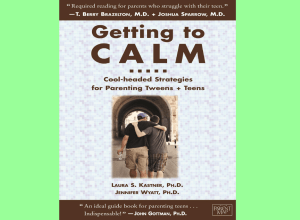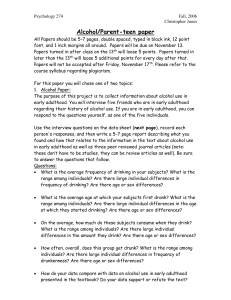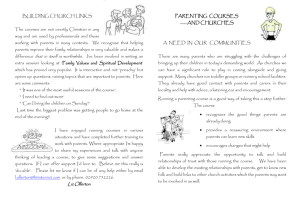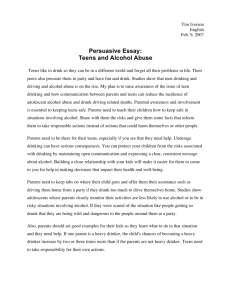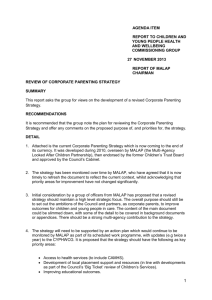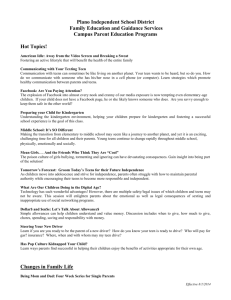Young people, alcohol and drugs - Department for Education and
advertisement
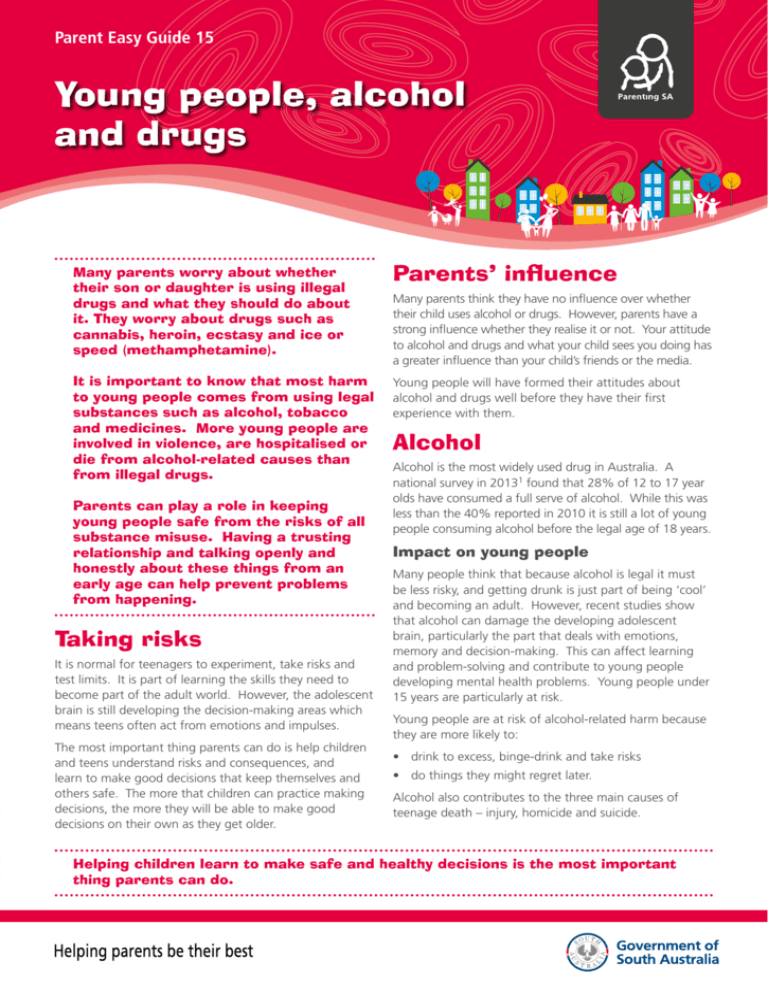
Parent Easy Guide 15 Young people, alcohol and drugs Many parents worry about whether their son or daughter is using illegal drugs and what they should do about it. They worry about drugs such as cannabis, heroin, ecstasy and ice or speed (methamphetamine). Parents’ influence It is important to know that most harm to young people comes from using legal substances such as alcohol, tobacco and medicines. More young people are involved in violence, are hospitalised or die from alcohol-related causes than from illegal drugs. Young people will have formed their attitudes about alcohol and drugs well before they have their first experience with them. Parents can play a role in keeping young people safe from the risks of all substance misuse. Having a trusting relationship and talking openly and honestly about these things from an early age can help prevent problems from happening. Taking risks It is normal for teenagers to experiment, take risks and test limits. It is part of learning the skills they need to become part of the adult world. However, the adolescent brain is still developing the decision-making areas which means teens often act from emotions and impulses. The most important thing parents can do is help children and teens understand risks and consequences, and learn to make good decisions that keep themselves and others safe. The more that children can practice making decisions, the more they will be able to make good decisions on their own as they get older. Many parents think they have no influence over whether their child uses alcohol or drugs. However, parents have a strong influence whether they realise it or not. Your attitude to alcohol and drugs and what your child sees you doing has a greater influence than your child’s friends or the media. Alcohol Alcohol is the most widely used drug in Australia. A national survey in 20131 found that 28% of 12 to 17 year olds have consumed a full serve of alcohol. While this was less than the 40% reported in 2010 it is still a lot of young people consuming alcohol before the legal age of 18 years. Impact on young people Many people think that because alcohol is legal it must be less risky, and getting drunk is just part of being ‘cool’ and becoming an adult. However, recent studies show that alcohol can damage the developing adolescent brain, particularly the part that deals with emotions, memory and decision-making. This can affect learning and problem-solving and contribute to young people developing mental health problems. Young people under 15 years are particularly at risk. Young people are at risk of alcohol-related harm because they are more likely to: •• drink to excess, binge-drink and take risks •• do things they might regret later. Alcohol also contributes to the three main causes of teenage death – injury, homicide and suicide. Helping children learn to make safe and healthy decisions is the most important thing parents can do. Starting to drink alcohol Some people think letting young people drink at home, supervised by parents, will do no harm - it will help them drink sensibly when they turn 18. Studies now show this is not the case. The earlier young people start to drink, the greater the chance they will have problems with alcohol later in life. It is best to delay drinking for as long as possible. Drugs Many parents wonder why young people would even think of trying drugs. Because young people learn about the world by trying out new things and testing limits, it’s not surprising that some will try illegal drugs as well as legal ones. It can help to remember that many young people don’t experiment with drugs at all. •• Cannabis (marijuana) is the illegal drug most used by young people. Parents can worry this is just the start of going on to use other drugs such as heroin or ice. However, there is no evidence that using cannabis automatically leads to the use of other drugs. •• Of those who try illegal drugs, many won’t go on using drugs regularly. •• Using drugs is not the same as being addicted to drugs. In most cases addiction happens over time although some people become addicted faster than others. Those who develop serious problems usually have lots of other things going on for them. Some young people use alcohol or drugs to help them cope with worries or mental health problems. If you think this may be happening for your child it is important to get help. Your doctor, counsellor or services in this Guide are good places to start. What parents can do to prevent problems There is no way to guarantee your child will never take drugs but a trusting relationship can help prevent substance misuse. Talking openly and honestly about alcohol and drugs from an early age will help prepare children and young people to deal with things that might arise. You can also help them learn to make good decisions and to understand they always have choices. Talking with children •• Get the facts about drugs and alcohol so children see you as a credible source of information (see the end of this Guide for sources). •• Start talking with children over about eight years of age in ways that suit their age and development. •• Find out what they already know. Schools start introducing the topic of alcohol and drugs in ageappropriate ways from a young age. •• Take opportunities as they arise to give accurate, balanced information. Be careful not to scare them. Encourage healthy attitudes before they start high school – it will help protect them from any unhealthy attitudes they encounter. •• Use TV, movies or people you see affected by alcohol or drugs to have a conversation. Help children think about what they might do in that situation. •• Spend time building a strong relationship with children before the teen years. Be involved in their lives, know their friends and interests. Show you are genuinely interested. Tell your children you love them. Notice the good things they do and tell them – it builds their self-esteem. Talking with pre-teens and teens •• Be approachable and unshockable. Listen to their ideas even if you don’t agree with them. •• Try not to interrupt or react in ways that stop discussion. Don’t make them worried about telling you things you need to hear. •• Show them where to get accurate information from reliable sources. •• Have family rules about alcohol and drugs. Use the facts to back up your views and make sure children know the rules are for their safety and wellbeing. You are not trying to spoil their fun. Agree about consequences together. Rules can be reviewed as they get older and develop more skills. •• Encourage young people’s involvement in activities such as sports and hobbies. Take an interest in their lives. Know their friends and make them welcome in your home. •• Make sure young people can get home safely when they go out. Have an emergency plan, e.g. a pre-paid mobile phone to call you, or permission to take a taxi and you’ll pay. If this happens often, talk with them about what else might be going on. •• Reward responsible behaviour. You could allow teens to stay out a bit later or have an extra night out. Whatever your relationship with your child, it is never too late to start talking about alcohol and drugs. Learning to make good decisions Parents can help children learn to make decisions that keep themselves and others safe and healthy. Some parents tell children to just ‘Say no’ but it is better to help them build skills for making good decisions in any situation. You could: •• talk about risks and consequences and the options people have in different scenarios. Children learn that they have choices •• teach responsible behaviour. Let children practice making choices from an early age. Give them more responsibility as they grow up •• acknowledge good decisions and help them learn from their mistakes. You are a role model for your children. Be prepared to look at your own use of alcohol, tobacco, medications and other drugs. Peer groups Peer groups are very important to young people. They want to feel ‘normal’, to ‘fit in’ and belong with those of their own age. However, peer group pressure can be overstated. Most young people decide to drink or take drugs without being pressured, forced or tricked. They may choose a peer group because of what the group is doing, e.g. how they dress, the music they listen to, or whether or not they drink or take drugs. Support your teen to have a number of friendship groups. They will have a bigger network to connect with if one group starts drinking or using drugs. When young people get information about alcohol and drugs from friends it is often not accurate. How will I know if they are taking drugs? This is a common question parents ask, but there’s no easy, sure way to tell. Parents who know their child well may notice when there are gradual or sudden changes in emotions or behaviour. They may wonder whether it is a sign of drug use. It may be, but it’s important not to jump to conclusions. Changes could be caused by something else such as illness, problems at school or with friends. Are things going on in your family that could be affecting them? Changes may include: •• unusual or out-of-character behaviour •• mood swings that are more than the usual ups and downs caused by hormonal changes in adolescence •• being aggressive •• being withdrawn or avoiding being with the family •• a drop in school work or attendance •• dropping out of activities or sports they usually enjoy •• an unexplained or sudden change to a new group of friends •• big changes in physical appearance •• eating problems •• changes in sleeping patterns •• valuable items or money missing at home. If any of these things are happening it may be a sign something is going on for your child. They may need extra help and support. If you want to know about specific drugs and their effects, see the end of this Guide for places that can provide more information. How to talk with your child about your concerns It is important to talk with your teen if you’re worried they might be using drugs. How you handle these conversations will make a difference to how they respond. •• Talk about it when you are both in a reasonable mood and alone together, e.g. when driving in the car, but not when you’re in a hurry. •• Say something that opens up the subject in an easy way, e.g. ’I’ve noticed you haven’t been yourself lately. Are things OK for you?’ Most teens will let you know what’s happening if: -- you ask at the right time -- they’re not afraid of punishment -- they see you as caring and supportive. •• Make it easy for them to talk to you. Try talking about someone else you know. You might say, ‘I was talking to a friend about her daughter using drugs. She was very worried. What do you think she should do?’ Sometimes a young person will test out parents by talking about a friend when they really mean themselves. Be careful how you respond. What if they are using drugs? If you find your son or daughter has used, or is using drugs remember blame is not helpful. •• Don’t react immediately. Give yourself time to calm down and think through what’s happening. •• Strong reactions are common but they don’t help. A big argument might back you both into a corner and harm your relationship. •• Tell them you’re concerned about their wellbeing and you think they might be using drugs. Let them know you want to help. •• Give them a chance to tell you what’s happening without interrupting or lecturing. Find out what drugs are being used, how often and where they are being used. •• The best way to find out what’s happening is to ask them - that is, by talking rather than by ‘detection’. Don’t become the ‘drug squad’ and search for drugs. The loss of trust will be greater than the benefit of anything you might find out. •• Find out if they want to stop using drugs. Are they able to stop by themselves or do they need help? How can you support them? •• If they are an older teenager and don’t want to stop using drugs you may have to come to terms with the fact that they’re making their own life choices. You still have the right to say they’re not to use illegal drugs at home or to come home under the influence of drugs. •• Let them know you love them but they need to abide by the rules of your home while living there. Be clear about the consequences for breaking these rules and follow through on these. •• Some parents tell their teenager to give up the drugs or they’ll have to leave home. If you say this, be sure it’s what you really want. While your teen needs to accept the consequences of their choices, it is also important they have somewhere safe to go. •• If their drug use brings them into contact with the legal system give them moral support but allow them to face the consequences of their choices. Rescuing them, e.g. paying their fines, often results in them continuing to use drugs. Getting help Ask for help. You don’t need to handle this alone. If your teen is still at school, teachers may be able to provide information about any issues your child is having and suggest strategies to support them. The school counsellor may be able to help. Your doctor, a health professional or the services in this Guide are also good places to find information and support. If you think someone has passed out from drug or alcohol use, put them on their side and phone 000 immediately for an ambulance. Don’t hesitate. Paramedics do not need to involve the police. 1 2013 National Drug Strategy Household Survey Want more information? Emergencies Phone 000 for ambulance, police or fire Police attendance Phone 131 444 for non-urgent police attendance Drug and Alcohol Services of SA (DASSA) Information, counselling and a range of support services for people experiencing alcohol and drug problems www.dassa.sa.gov.au Alcohol and Drug Information Service (ADIS) Phone 1300 131 340 Free, confidential telephone information and referral www.sahealth.sa.gov.au National Drugs Campaign Information about drugs and their effects including pictures of different drugs. Tips for parents on talking with their teens www.drugs.health.gov.au The Australian Drug Foundation Alcohol and other drug information, research and fact sheets for parents, young people, health professionals www.adf.org.au Drug Info Facts and resources about alcohol and drugs www.druginfo.adf.org.au 0439 TELL ME Text a drug name to 0439 835 563 and receive a text with information about the effects of the drug and links to further information The Other Talk Talking with your children about alcohol and other drugs, safe partying and relevant laws www.theothertalk.org.au Grog Watch A blog about preventing alcohol-related harm in families and communities www.grogwatch.adf.org.au Parenting Strategies Parenting Guidelines for Adolescent Alcohol Use; ‘Preventing adolescent alcohol misuse’ free online course for parents www.parentingstrategies.net Youth Mental Health Service Phone 13 14 65, 24 hours. Supporting young people 16 to 24 years to manage their mental health www.sahealth.sa.gov.au Headspace National Youth Mental Health Foundation Phone 1800 650 890, 9am-1am. Help for parents and young people 12–25 years www.headspace.org.au Kids Helpline Information for children and young people on a range of topics, including alcohol and drugs www.kidshelp.com.au ReachOut Online mental health support for young people www.au.reachout.com Quit SA Phone 13 78 48 Phone information and support to stop smoking www.cancersa.org.au/quitline Raising Children Network For parenting information www.raisingchildren.net.au Child and Youth Health For parenting and child health information www.cyh.com Parenting SA For other Parent Easy Guides including ‘Young people and parties’, ‘Living with young people’, ‘Talking sex with young people’, ‘Young people, feelings and depression’, ‘Young people and food’ and ‘Young people who are gay, lesbian or bisexual’ www.parenting.sa.gov.au Parenting SA A partnership between the Department for Education and Child Development and the Women’s and Children’s Health Network. Phone: 08 8303 1660 Web: www.parenting.sa.gov.au Parent Easy Guides are free in South Australia. Important: This information is not intended to replace advice from a qualified practitioner. © Government of South Australia. Revised:09/2015.
